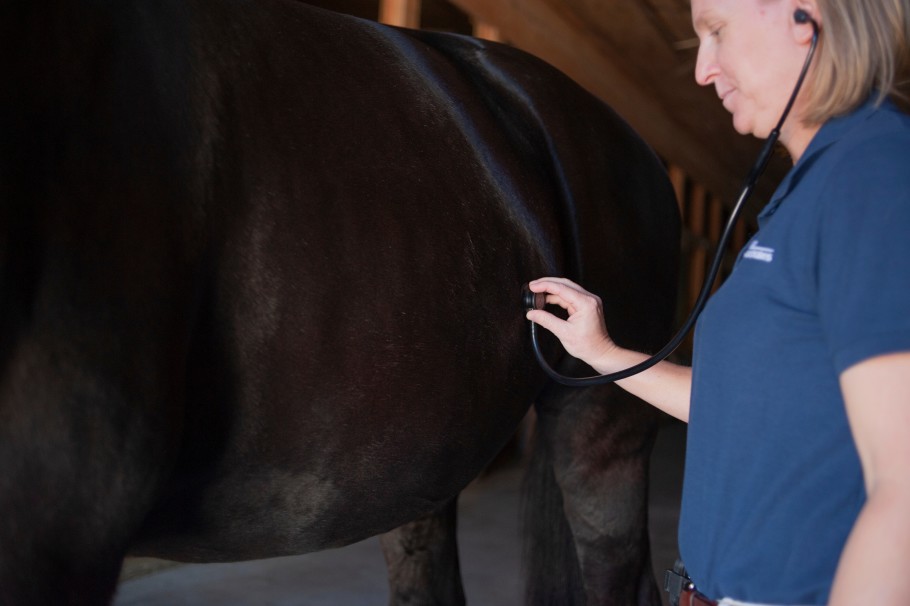Conditions that Affect the Horse's Hindgut
Updated July 3, 2024

Many people operate under the assumption that there are really only two conditions that affect the health of the equine gut: gastric ulcers in the stomach and colic in the hindgut. The truth is that colic is just one among many conditions commonly affecting hindgut health in horses. Plus, colic may be a final stage of poor hindgut health that has already been brewing.
A horse that has colicked is likely suffering from less than optimal hindgut health that still needs to be resolved even after the colic episode has ended. Alternatively, just because a horse has never colicked doesn’t mean it isn’t suffering from another hindgut problem.
Here are some other conditions that commonly affect the equine hindgut that can negatively impact behavior and performance as well as overall health.
Equine Hindgut Acidosis

The equine hindgut is home to a diverse population of bacteria, protozoa, and other microorganisms. These beneficial microbes are responsible for breaking down fibrous food (forage such as grass, hay, and beet pulp) to produce valuable nutrients that can be absorbed through the hindgut. This is the process of fermentation, and it can provide up to 70% of a horse’s energy requirements.
This healthy population of microbes can be disrupted easily. Undigested sugars and starches reaching the hindgut (such as with diets that include grain-based feeds or rich spring grasses) cause the beneficial microbes to produce more lactic acid in the fermentation process. This raises the acidity, also known as lowering the pH, of the hindgut. This state of increased acidity is called hindgut acidosis.
How Hindgut Acidosis Affects a Horse
- Raised acidity can kill good bacteria, further disrupting the delicate balance of the hindgut.
- Toxins (called endotoxins) released when beneficial bacteria die are known to be contributing factors to laminitis and colic.
- Reduces the hindgut’s ability to effectively absorb nutrients, and these nutrient deficiencies can contribute to lethargy, resistance, and poor overall health.
- Discomfort from poor hindgut health can negatively impact a horse’s behavior and performance.
Low-Grade Hindgut Inflammation in Horses
The same chain of events that causes hindgut acidosis may also lead to low-grade hindgut inflammation in horses when the drop in pH is less significant. Even small amounts of undigested starch reaching the hindgut can lower its pH. While the change may not be severe enough to cause a true state of acidosis, it can still cause irritation and inflammation of the hindgut’s mucosal lining.
This, in turn, makes it more difficult for the horse to absorb nutrients and contributes to ongoing discomfort that hurts a horse’s behavior and performance.
Ulceration of the Hindgut

For years it seemed that gastric ulcers (lesions in a horse’s stomach) were the only gastrointestinal tract ulcers anyone talked about. However, in more recent years, veterinarians and researchers have grown increasingly aware of the presence and potential impact of ulcerations affecting the equine colon.
Our own peer-reviewed research, Results of a large scale necroscopic study of equine colonic ulcers published in the Journal of Equine Veterinary Science, demonstrated not only that colonic ulcers exist but that their incidence among performance horses is significant. In a group of 365 horses, 45% were found to have colonic ulcers. In a group of 180 horses specifically identified as performance horses, 63% had colonic ulceration. Studies performed in subsequent years have found that these rates are steadily rising.
Potential triggers for colonic ulcers include excessive use of non-steroidal anti-inflammatory drugs or NSAIDs, such as Bute (phenylbutazone), and parasites.
Signs That May Point to Ulcers in the Hindgut
- Changes in attitude
- Poor appetite
- Decreased performance and energy
- Decline in body condition
- Girthiness and sensitivity in the flank area
- Unwillingness to work
Unfortunately, many signs of hindgut ulceration are also consistent with gastric ulcers or other health conditions unrelated to the GI tract. As a result, it is best to allow the veterinarian to determine what’s going on with your horse, using diagnostic tools like gastroscopy and the Equine Fecal Blood Test.
The Susceptible Equine Hindgut
These are a few of the most common problems affecting the equine hindgut – more prevalent than colic and perhaps instigators of it in some cases. Other hindgut problems include parasites and protein losing enteropathy, to name just a few.
The equine hindgut is delicate and easily impacted particularly by how and what we feed. As such, it’s important to know the factors so you can evaluate your feed and management program and provide digestive support.